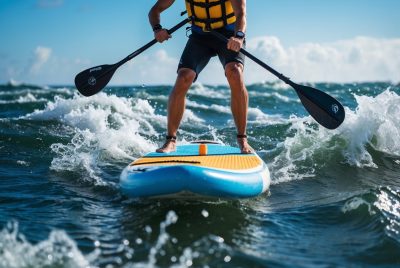Kayaking for Mental Health Benefits
*We may earn a commission for purchases made using our links. Please see our disclosure to learn more.
Kayaking for Mental Health Benefits: How Paddling Supports Wellbeing
Here’s the hot topic as of late, Kayaking For Mental Health Benefits! I’ve noticed that spending time outside helps clear my mind and reduce stress. Kayaking is one way I connect with nature while gently moving my body. The steady rhythm of paddling, surrounded by open water and fresh air, calms my thoughts and helps me feel more relaxed.

Kayaking supports mental wellness by easing stress, lifting mood, and offering a peaceful escape from busy life. When I kayak, I find that worries seem to fade, and it’s easier to focus on the present moment.
For me, kayaking isn’t just about exercise; it’s a simple way to take care of my mental health. With every paddle stroke, I find myself feeling lighter and more at peace.
Mental Health Benefits of Kayaking

Kayaking helps manage stress, improves my mood, and supports my mental well-being. Time on the water lets me find peace, stay present, and develop coping skills for anxiety.
Stress Reduction Through Paddling
When I kayak, the gentle sounds of water and the steady rhythm of paddling calm my mind. These repetitive motions are almost meditative. I get to disconnect from distractions like phones and screens, which gives my mind a break.
Researchers and mental health experts agree that being outside, especially in nature, reduces levels of stress hormones such as cortisol. The sense of freedom I feel on open water makes my worries feel smaller. This environment encourages me to breathe deeply, relax my muscles, and focus on the moment.
Below is a list of key ways kayaking reduces stress:
- Natural scenery eases mental tension.
- Physical activity releases endorphins.
- Unplugging from technology helps me reset.
Boosting Mood and Emotional Wellness
Kayaking boosts my mood in several practical ways. Physical activity increases my brain’s production of chemicals like serotonin and dopamine, which are linked to happiness. Even after a short paddle, I feel less irritable and more positive.
Spending time outdoors fills me with a sense of accomplishment and control. Meeting small goals—like learning a new stroke or paddling farther—improves my confidence. When I kayak with others, sharing the experience adds to my sense of connection, which also supports emotional health.
Key benefits for mood:
- Releases feel-good chemicals
- Builds self-confidence
- Increases social connection
Kayaking as an Anxiety Management Tool
I use kayaking as a tool to cope with anxiety. Focusing on paddling and the environment pulls my mind away from anxious thoughts. I practice mindfulness by paying attention to each stroke, the sound of water, and how my body moves.
If anxious feelings start to build, slow and steady breathing while paddling helps calm me down. Nature’s sights and sounds add to this effect, making it easier for me to regain control over my emotions. These moments teach me that I can manage stress in the real world.
Tips for using kayaking to ease anxiety:
- Focus on breathing and rhythm
- Take breaks to enjoy the surroundings
- Set achievable paddling goals
Physical Activity and Its Impact on the Mind

Kayaking helps my body stay active and my mind feel better. Staying active outdoors can change how I feel, think, and even how well I sleep at night.
Exercise-Induced Endorphin Release
While I kayak, my muscles work hard, and my heart rate rises. This active movement causes my body to release chemicals called endorphins. Endorphins are natural substances in my brain that help reduce feelings of pain and stress.
These endorphins boost my mood and leave me feeling happier and more relaxed. After paddling for even a short time, I often notice a lift in my spirits. Physical activity, especially outdoors like kayaking, can take my mind off worries and help break the cycle of negative thoughts.
Researchers say that listening to water, being out in nature, and moving my body all increase these positive brain effects. Even when I paddle at a slow or steady pace, the benefits are real and noticeable.
Improved Sleep Quality
After kayaking, I usually sleep better at night. Physical activity like paddling uses energy, which helps my body get ready for restful sleep. Regular exercise also keeps my sleep schedule steady.
Kayaking outside in natural light improves my body’s internal clock, making it easier to fall asleep at night. Exposure to sunlight during the day also helps my body make melatonin. Melatonin is a hormone that helps me feel sleepy when it’s time for bed.
Some people who kayak say their minds feel calmer, so they don’t stay awake worrying. Combining exercise and time in nature supports better sleep, which is important for my mental health.
Connection With Nature and Mindfulness

Kayaking helps me slow down and focus by connecting me with the outdoors. I find that spending time on the water offers a break from screens and stress, while the natural setting improves my mood and makes it easier to be present.
Mindful Presence on the Water
When I kayak, I need to pay attention to each paddle stroke and the balance of my body. This keeps my mind on what I am doing right now. I feel the temperature of the water, hear the sound of paddles dipping in, and see the gentle waves moving around me. All these senses keep me focused in the present moment.
This kind of full attention is what people call mindfulness. It helps me let go of worries about the past and future. The steady, repeated motion of paddling acts like a meditation. If my thoughts wander, the movement and sounds bring me back. This makes stress fade because I cannot focus on two things at once.
I often find that just a short time on the water leaves my mind clearer than before. Paying close attention to simple movements and the environment means I’m not stuck on small problems or distractions. This mindful state brings a feeling of calm and focus.
Nature Exposure for Mental Clarity
Kayaking puts me straight in the middle of natural beauty, away from noise and busy routines. I see birds, plants, clear skies, and open water. Research shows that being outside can lower feelings of stress and anxiety, and I notice this difference in myself every time.
Natural sounds, like wind rustling in trees or water lapping at the hull, help relax my mind and body. The rhythm of nature feels peaceful, and I often notice my mood improving after only a short trip. For anyone who spends a lot of time indoors, this kind of nature exposure gives a chance for my mind to reset.
Here’s a simple list of what I notice during a typical kayak trip:
- Calmer breathing
- Fewer racing thoughts
- A feeling of being refreshed when I return
- More focus for the rest of the day
I find that time in nature, even without any other activity, works as a natural boost for my mental health. Combined with the movement of kayaking, it leaves me feeling more clear-headed and positive.
Social and Community Aspects of Kayaking

Connecting with others through kayaking can lead to real friendships, shared experiences, and stronger feelings of belonging. Time on the water with others helps support emotional balance and brings new people into my life.
Building Supportive Relationships
Kayaking gives me a chance to meet people with similar interests. When I paddle with others, we work together to overcome challenges like rough water or tricky routes. We look out for one another, making sure everyone is safe and having fun.
Trust grows quickly on the water. I share advice, stories, and even food with others in my group. This makes it easier for me to open up. Many people I meet through kayaking become friends I talk to outside the activity too.
Consistent group outings build a sense of trust and responsibility. I know that if I need help, others will be there for me. This support is important, especially if I am feeling stressed or down. Feeling connected to others boosts my mood and helps me feel less alone.
Kayaking For Mental Health Benefits: Group Kayaking for Social Wellbeing
Participating in group kayaking supports my mental health. The act of paddling together helps me feel included and valued. Everyone has a role, whether we are planning the trip, sharing equipment, or helping each other launch the kayaks.
Kayak clubs and group trips often bring together people from many backgrounds. Diversity in these groups exposes me to new ideas, ways of thinking, and stories, which enriches my perspective. This makes group kayaking feel welcoming and accessible.
Being outside with others in a social setting lowers my stress. Shared laughter and teamwork make the day more enjoyable. We often create group rituals, like post-paddle meals or photos, building memories together.
If I attend group events often, it becomes easier to build connections. The regular social contact helps prevent loneliness and strengthens my sense of community. These positive experiences encourage me to keep coming back.
Tips for Incorporating Kayaking Into a Wellness Routine

Kayaking can be a practical way to support my mental health. To get real benefits, I focus on safety and set clear, reachable goals for myself.
Getting Started Safely
When I first began kayaking, safety was my top priority. I chose water conditions that matched my skill level and always wore a life jacket.
Before heading out, I checked the weather and stayed away from strong winds or storms. I made sure to tell someone where I was going and when I planned to return.
Taking a beginner class helped me learn correct paddling techniques and basic rescue skills. I also got comfortable with my kayak and gear before going on longer trips.
I brought water, a snack, and sun protection with me. If I felt tired or uneasy, I rested and avoided pushing myself too hard. My main goal was to have a safe and positive experience every time.
Setting Realistic Wellness Goals
I found that setting specific, realistic goals kept me motivated and made each kayaking trip more rewarding. Instead of aiming for long distances right away, I started with short sessions on calm water.
I tracked my mood before and after paddling. This helped me notice positive changes, like feeling calmer or happier after being on the water.
To keep myself on track, I scheduled regular kayaking days, even if the sessions were short. I focused on enjoying the experience instead of chasing certain performance targets.
Sometimes I kayaked with friends or joined a local club for social support. Connecting with others made the activity more enjoyable and reduced stress, which helped me stay committed to my wellness routine.
Kayaking For Mental Health Benefits: Frequently Asked Questions
Kayaking offers mental health benefits like reducing stress, boosting mood, and even improving focus. It also provides chances for social connections and helps me feel more connected to nature.
1. How does kayaking impact mental well-being?
When I kayak, I notice a sense of calm from being on the water. The act of paddling and focusing on the movement helps my mind slow down. Exposure to natural surroundings can lower feelings of anxiety or sadness.
2. Can kayaking be considered a form of meditation or mindfulness?
I find that kayaking involves paying attention to each stroke and the rhythm of the water. This brings my focus to the present moment, similar to mindfulness exercises. Some days, kayaking feels like moving meditation because I tune out distractions and feel fully aware.
3. What psychological effects does kayaking have on stress levels?
Kayaking often lowers my stress through physical activity and time outdoors. The repetitive motion and fresh air help me relax and release tension. Spending quiet moments on the water gives my mind a break from daily worries.
4. How does the practice of kayaking influence mood and emotional state?
I usually feel happier after kayaking, likely due to the endorphins from exercise. Being active outside and achieving something simple, like reaching a new spot on the river, gives me a mood boost. Regular kayaking can help manage feelings of irritability or fatigue.
5. Are there any cognitive benefits associated with regular kayaking?
Kayaking requires me to pay attention to my environment, steering, and balance. This level of focus can sharpen my concentration and mental clarity. Over time, regular paddling may support a stronger memory and decision-making skills.




